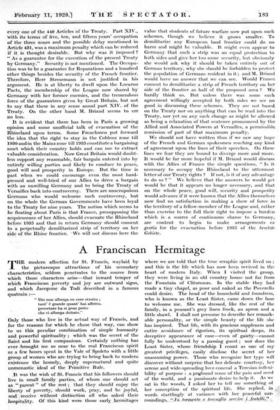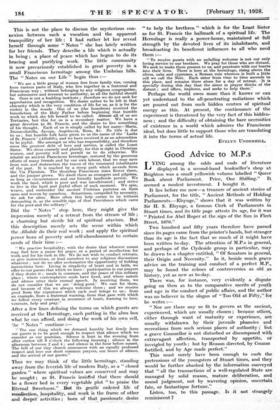A Franciscan Hermitage T HE modem affection for St. Francis, waylaid
by the picturesque attractions of his secondary characteristics, seldom penetrates to the source from which those characters arise—that inward temper of which Franciscan poverty and joy are outward signs, and which Jacopone da Todi described in a famous quatrain :- " Dio non alberga en core stretto ;
tent' a grande quant' hai affetto.
povertate ha si gran petto the ci alberga deitate."
Only those who live in the actual way of Francis, and for the reasons for which he chose that way, can show to us this peculiar combination of simple humanity and powerful spirituality ; which was the secret of the Saint and his first companions. Certainly nothing has ever brought me so near to the real Franciscan spirit as a few hours spent in the Vale of Spoleto with a little group of women who are trying to bring back to modern existence the homely, deeply supernatural and quite unmonastic ideal of the Primitive Rule.
It was the wish of St. Francis that his followers should live in small family parties, of whom one should act as " parent " of the rest ; that they should enjoy the liberty of poverty, should work, pray, and be joyful, and receive without distinction all who asked their hospitality. Of this kind were those early hermitages where we are told that the true seraphic spirit lived on ; and this is the life which has now been revived in the heart of modern Italy. When I visited the group, they were living in an old country house not far from the Fountain of Clitumnus. In the stable they had made a tiny chapel, as poor and naked as the Poverello could, desire. The head of the household and foundress, who is known as the Least Sister, came down the lane to welcome me. She was dressed, like the rest of the family, in a peasant's grey linen frock, an apron and a little shawl. I shall not presume to describe her remark- able personality, or the simple beauty of the life she has inspired. That life, with its gracious suppleness and entire avoidance of rigorism, its spiritual deeps, its deceptive appearance of ease—even of gaiety—cannot fully be understood by a passing guest ; nor does the Least Sister, whose friendship I count as one of my greatest privileges, easily disclose the secret of her unassuming power. Those who recognize her type will discover without surprise that her delicate courtesy, her serene and wide-spreading love conceal a Teresian inflexi- bility of purpose : a prgfound sense of the pain and need of the world, and a passionate desire to help it. As we sat in the woods, I asked her to tell me something of her conception of the spiritual life. She replied, in 44 words startlingly at variance with her peaceful stir. roundings, torgient _traMglif pert re. ,i,fratf1147. This is not the place to discuss the mysterious con- nexion between such a vocation and the apparent tranquillity of her life : I had rather let her reveal herself through some " Notes " she has lately written for her friends. They describe a life Which is actually in being ; a place of peace which has begun to do its bracing and purifying work. The little community is now precariously established in great poverty in a small Franciscan hermitage among the Umbrian hills. The " Notes on our Life " begin thus :—
" We are a little group of women free from family ties, coming from various parts of Italy, who live together in a fraternal and Franciscan way ; without belonging to any religious congregation, but submissive and reverent to authority, as all the faithful should be. Ours is not a budding institute ; therefore we do not seek for approbation and recognition. We desire rather to be left in that obscurity which is the very condition of life for us, as it is for the violets in the woods. One of us (the foundress) received the benediction of the Holy Father before beginning that humble work to which she felt herself to be called. Almost all of us are Tertiaries, but this for us is a secondary matter. We have a great devotion to St. Francis, and the desire to live something of his thought. Each of us is simply called by her name—Maria, Irnmacolatella, Jacopa, Angeluccia, Rosa, &c. No title is due to us ; but humble folk have given to us the name of the ' Larks of St. Francis' (Allodole), and we have received it as an admonition to be joyful. She amongst us who has responsibility, and therefore owes the greatest debt of love and service, is called the Least Sister. We dress coarsely and plainly, for this is right in Christian women, and poverty will not permit us to do otherwise. We inhabit an ancient Franciscan hermitage, restored by the generous efforts of many friends and by our own labour, that we may save from ruin and destruction the traces of the venerated inhabitants of the past. It is reached by a steep path which ascends from the Via Flaminia. The thornless Franciscan roses flower there, and the juniper grows. We dwell there as strangers and pilgrims, so long as circumstances and our friendly landlords permit. We work the land, which is poor and was uncultivated ; and strive to live in the hard and joyful effort of each moment. We spin, weave, and embroider the ancient Umbrian patterns on linen spun and woven by ourselves. • Sometimes, compelled by necessity, we ask for alms. More often this help comes to us without demanding it, as the sensible sign of that Providence which cares for the poor and the solitary."
Did the " Notes " stop here, they might give the impression merely of a retreat from the stream of life ; a charming but sterile bit of spiritual atavism. But this description merely sets the scene within which the Allodole do their real work ; and apply the spiritual power born of poverty and self-abandonment to certain needs of their time :— " We practise hospitality, with the desire that whoever comes may find here a pause for peace, or a period of recollection for work and for his task in life. We do not wish to conduct retreats, or give instructions, or lend ourselves to any religious discussions whatever ; nor do we offer ecclesiastics the opportunity of holding instructions here. Living in simplicity of heart and in faith, we offer to our guests that which we have : participation in our prayers if they desire it ; meals in common, and the peace of this solitary place ; where contemplative souls have lived, and where nature and silence utter their eternal speech. In' receiving them, we do not consider that we are ' doing good.' . We care for them, and because of this we always welcome them ; and we receive good from the experience which, each soul bringi to us : from an example, from a fraternal warning, from that gaze with which we follow every creature in reverence of heart, learning to love, venerate, help and pray."
After a few lines defining the terms on which guests are received at the Hermitage, each putting in the alms box what he can afford, and doing the work of his o.wn cell, the " Notes " continue :— " The one thing which we demand humbly but firmly from our guests is to be good enough to respect that silence which we consider as our guardian. Silence is kept in the evening from after curfew till 9 o'clock the following morning ; silence in the afternoon between 2 and 4 ; and silence in the hour before sunset. The bell of our tiny church announces with an equally profound respect and love our short common prayers, our hours of silence,
and the arrival of our guests." '
Thus we may think of the little hermitage, standing away from the feverish life of modern Italy, as a " closed garden " where spiritual values are conserved and may be sought'; as St. Francis insisted that there should be- a flower bed in' every vegetable plot " to praise the Eternal Sweetness." :But its gentle' ordered life of r000llecpon, hospitality,. and . work is the frame of other - and deeper activities ; born of that passionate desire " to help the brethren "- which is for the Least Sister as for St. Francis the hallmark of a spiritual life. The Hermitage is really a power-house, maintained at 'full strength by the devoted lives of its inhabitants, and broadcasting its beneficent influences to all who need them :-- " To receive guests with an unfailing welcome is not our only loving service to our brothers. We pray for those who are distant. We seek to make them present to us, and penetrate with our hearts into their lives. There is here at the hermitage, rising above the olives, oaks and cypretises, a Roman ruin whereon is built a little cell we call the Nest. Each sister from time to time ascends to this place, and remains there alone for a day of retreat. It is specially 'during this day that the sister in prayer thinks of the distant ; and offers, implores, and seeks to help them."
Perhaps the world owes more than it knows or can yet understand to the all-penetrating radiations which are poured out from such hidden centres of spiritual energy as this. At present, the continuance of'the experiment is threatened by the very fact of this hidden- ness ; and the difficulty of obtaining the bare necessities of existence in a world which admires the Franciscan' ideal, but does little to support those who are translating it into the terms of actual life.
EVELYN UNDERHILL'







































 Previous page
Previous page